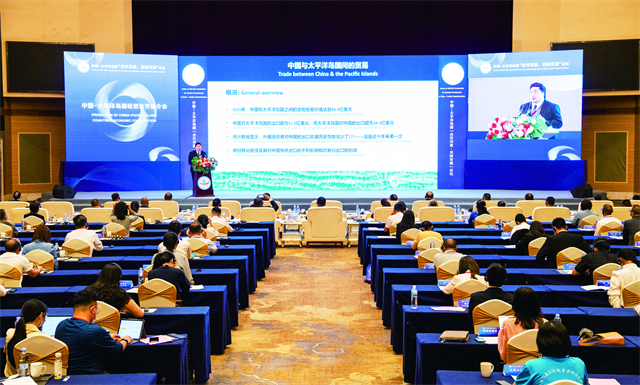Diplomatic missions embark on a root-seeking journey in Pingtan
en.ptnet.cn | Updated:2021-09-09
Across the vast Pacific and Indian Oceans, tens and thousands of islands are scattered in the wide-open sea, many of which share a common language called the Austronesian language.
Linguists are surprised to find that there are many consistent core vocabularies in the myriads of their languages. In recent years, several studies tracing the correlations of the forefathers of Austronesian people to Pingtan Island in East China’s Fujian province have surfaced, hinting at Pingtan as the cradle of civilization for the Austronesian people and the expansion of the Keqiutou Culture.

Forum on Win-Win Cooperation for Common Development of China-Pacific Island Countries hosted by the Chinese People’s Association for Friendship with Foreign Countries (CPAFFC) and the People’s Government of Fujian Province was held on Sept.6 in Pingtan.
At the invitation of the CPAFFC, 13 delegates from the Pacific Island Countries’ diplomatic missions to China and Pacific Trade Invest China visited Pingtan and embarked on a root-seeking journey.
Austronesian branched off from Pingtan’s Keqiutou Culture
In Pingtan, there is a Keqiutou relics site. According to expert research, the site can be dated back to about 6000 years ago. Inside the ruins, there are many shell pits and tombs. The unearthed relics include pottery, stoneware, boneware, jade, shellware, etc. As early as then, the forefathers of the Austronesian people had already started fishing, hunting, and foraging to sustain themselves.
Linguists have discovered that the timeline of the Keqiutou civilization coincides with that of the Austronesian people’s ocean exploration and migration. Judging from geography and timing, this early community fit in every qualification of being early seafarers.
Some experts said that the Keqiutou culture indicated the start of a prehistoric marine economy in Fujian. Its link with the Dabenkeng culture in Taiwan attests to the assumption that Pingtan is highly likely to be the first springboard for the Austronesian ancestors to move from the mainland to the island.
At present, the general belief in the international academic community is that around 6000 years ago, the ancestors who lived on the southeast coast of the Chinese mainland began to sail out to sea and migrate. Their first stop was another island- Taiwan, where they eventually settled. About 1,000 years later, they moved further out to the Philippines, followed by the vast Pacific and the Indian Ocean regions.
13 members of Austronesian lineage searches for their root
Two topics featuring the “promotion of the economic cooperation between China and Pacific island countries” and the “sustainable development of the marine economy” topped the agenda. Pingtan has been vigorously building itself into an international tourist destination. The topic "sustainable development of the marine economy" was highlighted at the forum.
The visiting representatives of the diplomatic mission are all from South Pacific island countries, which are Austronesian countries. On the sideline of the forum, they made a trip to the International Research Center of Austronesian Archaeology based in Pingtan, where they collectively set out on a root-seeking journey. The group also planted a tree as a token of brotherhood, discussed the origin and expansion of the Austronesian, and ushered in a new chapter of maritime international cooperation.
They also visited the scenic East China Sea Wonderland, the Cross-Border E-Commerce Logistics Park, and the Island Research Center to learn about Pingtan’s practice and achievements in island protection and development and marine economy development.
Spotted a mistake or want to add something? All rights reserved. Do not reproduce our content without permission–you can contact us directly on our Facebook messenger or Twitter mailbox. Follow @pingtanchina (Facebook/Twitter)

